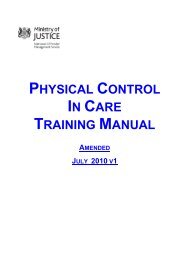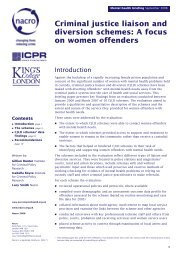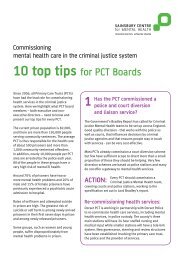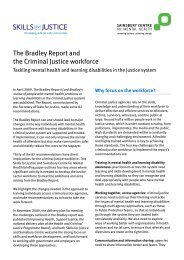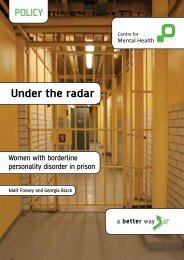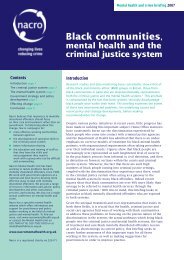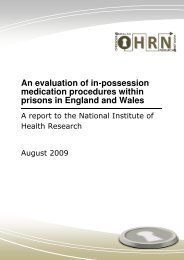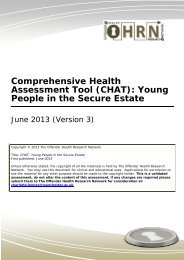Engendering Justice - from Policy to Practice - The Fawcett Society
Engendering Justice - from Policy to Practice - The Fawcett Society
Engendering Justice - from Policy to Practice - The Fawcett Society
- No tags were found...
You also want an ePaper? Increase the reach of your titles
YUMPU automatically turns print PDFs into web optimized ePapers that Google loves.
writing the Government had undertaken <strong>to</strong> publish it, alongwith the response, in April 2009. This review should providemuch needed guidance on the diversion of offenderswith severe mental health problems. <strong>The</strong> Commission isalso encouraged by the forthcoming offender health andsocial care strategy which should assist with developinga coherent strategic approach <strong>to</strong> the needs of womenthroughout the criminal justice system. This strategy shouldbe finalised and implemented as a matter of urgency.<strong>The</strong> Commission reiterates its earlier recommendation thatwhere the defendant or offender appears <strong>to</strong> the court <strong>to</strong>have mental health problems, but does not justify admission<strong>to</strong> hospital, they should not be remanded or sentenced <strong>to</strong>imprisonment without a medical report on the impact ofincarceration upon their health. Defendants or offendersshould not be sent <strong>to</strong> prison in order <strong>to</strong> obtain a psychiatricreport. In addition, the Commission recommends thatsentencers must have sufficient information aboutcommunity drug and mental health services so that they donot see cus<strong>to</strong>dy as the main solution for de<strong>to</strong>xification.<strong>The</strong> introduction of service level agreements betweenmagistrates’ courts and mental health services iswelcomed by the Commission and pilots are currentlybeing undertaken in South-West and North-West London.However, mental health services, particularly psychiatricservices, need <strong>to</strong> be linked more closely in<strong>to</strong> all courtsacross England and Wales <strong>to</strong> ensure that there is swiftaccess.Criminal <strong>Justice</strong> Liaison and Diversion (CJLD) Schemeshave been tasked with the role of diverting offenders withmental health needs away <strong>from</strong> the criminal justice system.<strong>The</strong>se schemes involve a range of services and operatewithin police stations, courts and in rural and urban areas.Provision is patchy with differing approaches and qualityacross schemes. From January 2006 <strong>to</strong> March 2007, anevaluation was carried out of 10 CJLD schemes. 32 It foundthat schemes were seeing on average 2 <strong>to</strong> 3 percent ofthe <strong>to</strong>tal number of offenders, which suggests a large poolof unmet needs. <strong>The</strong>re is a need for greater resourcing ofthese schemes <strong>to</strong> allow a nation-wide proactive approach;greater signposting and partnerships with availablecommunity provision; publicity for the schemes in policestations and courts and clear performance targets andmoni<strong>to</strong>ring by the Department of Health. 33Training and Awareness of Sentencers<strong>The</strong>re is widespread variation across courts as <strong>to</strong> the extent<strong>to</strong> which cus<strong>to</strong>dial sentences are utilised. 2006 figures showthat across the 42 criminal justice areas, cus<strong>to</strong>dy rates inMagistrates’ Courts ranged <strong>from</strong> 6 percent <strong>to</strong> 16 percentand in Crown Courts <strong>from</strong> 45 percent <strong>to</strong> 68 percent.A study by the Ministry of <strong>Justice</strong> revealed that thesevariations were not fully explained by a variation in typesof cases but rather seemed <strong>to</strong> depend on the relationshipbetween the courts and other criminal justice agenciessuch as the police and probation as well as the sentencers’understanding of the availability of community provision intheir local area. 34Sentencers must be made aware of the differential impactsentencing decisions have on women and men includingcaring responsibilities for children or elders; the impact ofimprisonment on mental and emotional well-being; and thedisproportionate impact that incarceration has on offenderswho have caring responsibilities if they are imprisoned along distance <strong>from</strong> home.<strong>The</strong> Commission was encouraged by the SentencingAdvisory Panel’s recognition that guidance is required inrelation <strong>to</strong> female offenders in its recent consultation paperon the overarching principles of sentencing. This includedthe proposed principle that:<strong>The</strong> statu<strong>to</strong>ry requirement that a cus<strong>to</strong>dial sentence mustnot be imposed unless the offence is so serious thatneither a fine alone nor a community sentence can bejustified has special force in relation <strong>to</strong> women offendersbecause of the multiple harms that are likely <strong>to</strong> result <strong>from</strong>incarceration. 35It was also encouraging that among the proposed mitigatingfac<strong>to</strong>rs listed as specifically applicable <strong>to</strong> women offenderswere: the link between women’s involvement in the criminaljustice system and prior victimisation; the high percentageof women who are the sole carers for dependent children;pregnancy; and the high proportion of women who suffer<strong>from</strong> mental health problems. <strong>The</strong> Commission suggeststhat it may also be appropriate for a non-exhaustive list ofharms which are likely <strong>to</strong> impact on women in cus<strong>to</strong>dy <strong>to</strong>be included in the overarching sentencing guidelines <strong>to</strong> alertsentencers <strong>to</strong> the potential impacts of decisions.Page 27



